Muhammad Ali, Rise In Power, June 3, 2016
BREAKING News
NB Commentary: The mystique around this man and his history goes far back for those of us who experienced his rise and unfortunate fall in the boxing world. As a former member of the Nation Of Islam, I remember this man as a hero, a warrior, an artist and a poet. Personally, boxing to me is a brutal sport, one that boggles my mind that anyone would want to step into a ring and beat on another human being. As a sport, it says a lot about who we are as human beings, but as an industry it says even more about the social engineering that takes place that has folks sitting in the audience, cheering their "champion" on as he beats the snot out of another man, and nowadays, another woman.
It's a brutal sport and there have been reports of how diseases similar to Parkinson's can be gotten by these fighters as their heads and brains are banged around in the ring and during training. Muhammad Ali was known for not allowing his opponent to get any punches to his face and head. He knew how to protect himself from those deadly blows but obviously, a few got in.
What I did in my head was to focus on his contribution as a man who "stood up" against the establishment of White Supremacy and the idiocy of fighting the white man's war when the war was really going on at home. It was a magnificent and moving time during the 60's and 70's as movement upon movement emerged from the grassroots and WITHOUT social media, I might add. It was also a tragic time, with our war weary heroes being cut down, one by one. So many people died during this era, so many leaders for social justice, human rights and civil liberties. Occupy Wall Street had nothing on the spontaneity of the various social activist groups that hit the streets. Many too numerous to mention in this short post but the impact of the times still stays with many of us who lived through it.
Born in 1951 I grew up in a neighborhood of predominately African Americans in North Philadelphia. My Mother always had this black pride thing going with her and she was one of the first people in our neighborhood to wear an Afro. She was always a rebel of sorts and I still don't know if she did it to be contrary or if she did it on the real. Nevertheless, the impact that she had on my life remains with me to this day, and I must admit that my love for my people comes from her admiration of the black skinned man and woman.
I joined the Nation of Islam in 1971, to my Mother's chagrin of which I do understand now, but certainly could not fathom what her problem was then. Didn't she tell me that black was beautiful, didn't she used to say that folks with light eyes had "the devil in them"? Didn't she encourage me to be a rebel by her own rebellious way of doing things? I soon realized that she didn't want me to rebel against her, and that's what she saw it as because I left the Catholic Church while going to a Catholic College and joined the infamous, Nation Of Islam.
There was the Most Honorable Elijah Muhammad, there was Malcolm X, there was Cassius Clay and there was Minister Jeremiah Shabazz. These folks towered over our heads in the "teachings" and we were in awe of them. And as for me, I will always pay homage to the Most Honorable Elijah Muhammad, the father I never had, the grandfather I never had. He is due that much respect because of the lessons I learned from his teachings.
"Two days after his first defeat of Liston, Clay announced his conversion to Islam, and on 6 March, he changed his name to Muhammad Ali. Liston later complained that the Black Muslims, a separatist sect, had threatened him in an attempt to throw the fight. Old ham boxing writers were happy to believe him, and so were America’s rightwing rednecks. Such a charge was at least given credence as the newly renamed boxer was a minister in the Nation of Islam, and the group’s self-proclaimed “messenger”, Elijah Muhammad, had, to all intents, become the boxer’s manager. (Ali was to convert to orthodox Islam in 1975.)" https://www.theguardian.com/sport/2016/jun/04/muhammad-ali-obituary?CMP=share_btn_fb
As time goes on we progress, we evolve and we learn but we still remember those days and how they changed us.
Today, I learned that one of those people who changed my life took his last breath
on this physical plane and made it outa here. It's amazing how when someone like that makes transition how you seem to time travel back to those poignant moments when they touched your life in a memorable way. Today, I went all the way back to 1971 when he lost that fight. I was in tears, standing near the mailbox, letter in hand, addressed with only his name, telling him how much I loved him and supported him and prayed for him. I dropped that envelope into the mailbox, with no stamp, no return address and no expectation that he would ever receive it as I cried real tears for this man, this icon, my hero, my warrior, "who floated like a butterfly and stung like a bee." It was a dark day for me because it felt like something cosmic had changed. I didn't know what to call it back then. The word cosmic was not a part of my vocabulary, but I felt a serious shift in my consciousness and I cried. It felt like a great war had been lost.
on this physical plane and made it outa here. It's amazing how when someone like that makes transition how you seem to time travel back to those poignant moments when they touched your life in a memorable way. Today, I went all the way back to 1971 when he lost that fight. I was in tears, standing near the mailbox, letter in hand, addressed with only his name, telling him how much I loved him and supported him and prayed for him. I dropped that envelope into the mailbox, with no stamp, no return address and no expectation that he would ever receive it as I cried real tears for this man, this icon, my hero, my warrior, "who floated like a butterfly and stung like a bee." It was a dark day for me because it felt like something cosmic had changed. I didn't know what to call it back then. The word cosmic was not a part of my vocabulary, but I felt a serious shift in my consciousness and I cried. It felt like a great war had been lost.
"If the two fights with Liston, epic in their theatricality and outcome, had begun to compile the legend, then the three contests with the uncomplicated, brooding warrior Joe Frazier, in 1971, 1974 and 1975, clinched the immortal deal. Here was an unmissably dramatic, defining, second act. Only six months after the exile’s return against Quarry, Ali squared up to the remorselessly committed hitter “Smokin’ Joe” to challenge for his own usurped title. After a thunderously pulsating, draining 14 rounds it was dead-level. In the last, a fearsome Frazier hook crunched into Ali’s jaw, broke it, and dumped him on the canvas, sprawling on his back. Frazier deservedly won the decision – but the fact that Ali somehow gathered himself to his feet and attempted to fight back not only had the fans round the world swooning at the heroism, but it gave notice of the added, and unconsidered, ingredient that would embrace Ali for the rest of his life." https://www.theguardian.com/sport/2016/jun/04/muhammad-ali-obituary?CMP=share_btn_fb
Knowing today, what I know about sports and entertainment, I have my suspicions about his illness. Some may call me paranoid, but I see it as discernment and critical thinking. When you look at the trail of tears caused by the fallen warriors during that time, it does beg to question… was a fix in??
This video playlist offers some suggestions as to Ali's debilitating health condition.
This video playlist offers some suggestions as to Ali's debilitating health condition.
"She said doctors told her the disease was not the result of absorbing too many punches but a genetic condition.Ten weeks before Ali's match in 1980 against Larry Holmes, a team of doctors at the Mayo Clinic submitted a medical report to the Nevada State Athletic Commission describing a small hole in his brain's outer layer and noting that the boxer reported a tingling sensation in his hands and slurred speech." http://www.cnn.com/2016/06/04/health/parkinsons-disease-explainer/"More than two decades later, there's still no way to determine whether boxing caused his Parkinson's; Ali may have been fated to develop this disorder even if he had been a lawyer. What is unequivocally true, however, is that professional boxing often damages the brain. Brain damage is as much an occupational hazard for boxers as black lung is for coal miners." https://patients.aan.com/resources/neurologynow/index.cfm?event=home.showArticle&id=ovid.com%3A%2Fbib%2Fovftdb%2F01222928-200602020-00005"In summary, this study highlights the fact that a PD diagnosis likely affects life span; and, among people affected by PD, dementia is a predictor of a shorter life span. As a significant non-motor feature of Parkinson’s disease, it is clear that additional research is needed to develop ways to diagnose and treat cognitive impairment in PD." http://www.pdf.org/en/science_news/release/pr_1325692019
"Muhammad Ali's personal doctor has revealed he cannot be sure that boxing contributed to the former heavyweight world champion's Parkinson's Disease.Our young brothers and sisters too, coming home from Vietnam… Malcolm, Martin, John, Robert, Medgar, and many others whose death sent shockwaves around the world….. These tragic deaths have a lasting effect on your psyche because they were rays of hope during a very, very cruel and hateful time. They each had their own battles, they each fought in their own arenas, some even gathered together for the same fight, but they were stalwart in the movement for justice.
Ali, considered by many to be the greatest boxer of all time, has suffered with the neurological syndrome since the mid-1980s and it has often been presumed that blows to the head during his 21-year professional career were a contributing factor to his condition.
But Dr Abraham Lieberman, who is the Medical Director of the Muhammad Ali Parkinson Centre, admits that it is not possible to be entirely sure what caused Ali to suffer from Parkinson's." Source: http://www.dailymail.co.uk/sport/boxing/article-2817592/No-proof-Muhammad-Ali-s-Parkinson-s-Disease-caused-boxing.html#ixzz4AfDtnkbk
"The government had already killed Kennedy, Malcolm, King, and abroad the father of black consciousness Steven Biko was killed and Nelson Mandela was in jail, and they had one more influential black man they had to silence. Ali won the Olympic gold medal in Rome the same year that Kennedy was elected president-1960; he won the heavyweight title and joined the Nation of Islam the same year that Civil Rights Bill was passed-1964. In 1966 the Black Panther Party was formed and Ali was inducted into the military in 1967 to keep his influence away from the movement but he foiled the government’s plans by refusing to go. In 1973 Eldrige Cleaver ran for Mayor of Oakland and in 1974 Ali was a the zenith of his influence after he beat Foreman in Africa and galvanized the African Diaspora by simultaneously championing black nationalism over Christianity. Ali is now the most famous person in the world, but he was on his way to becoming the most influential person in the world and he was too public a figure for the government to murder in the context of the atrocities they had recently committed. As a Black Nationalist, Ali couldn’t be allowed to become that prominent, and it is my belief that the government injected Muhammad Ali with MPTP to give him Parkinson’s to silence his gospel that would have changed the world unprecedentedly. My name is Kinshasa and these are my waking thoughts, you may disagree, but rest assured my intelligence is superior." https://readquestionmark.wordpress.com/2012/01/24/the-ali-conspiracy/
So, when he lost the fight, I was riddled from right to left, back and forth, up and down. Never knowing any of these people personally but the communal and social mystique surrounding them made them up front and personal in my mind.
And then he lost the fight. The Most Honorable Elijah Muhammad warned him,
don't go back into the ring. You have your championship! You are the greatest boxer of all times, don't go back. Stay with us, come with us, teach the lessons, so many people listen to you. But he didn't listen, and we in the Nation kinda knew why he lost. We wanted him to win, we hoped he would win and we prayed on it to, but he lost. And that was the story that we knew would happen, because our Messenger had warned him.
don't go back into the ring. You have your championship! You are the greatest boxer of all times, don't go back. Stay with us, come with us, teach the lessons, so many people listen to you. But he didn't listen, and we in the Nation kinda knew why he lost. We wanted him to win, we hoped he would win and we prayed on it to, but he lost. And that was the story that we knew would happen, because our Messenger had warned him.
To be clear, I am nowhere near as naïve as I was back in those days. I never heard of Co-Intel Pro or any of that stuff before I joined the Nation. I learned about that and more afterwards. But I knew about say it loud, I'm black and I'm proud!!! I also know that today, he can read my message to him, and maybe read that letter I placed in the mailbox decades ago, addressed to him, that let him know, I loved him and that he was one of my heroes. Of course, I am sure he will be very, very busy pouring through his cosmic mailbox.
Blessings to you Muhammad Ali, your family and loved ones
during these times.
May you Rise In Power.
And if you decide to return, may you return to a world of justice, freedom, righteousness and love, a world totally different from the one you left behind.
“We forgive Muhammad Ali his excesses,” an Ali biographer, Dave Kindred, wrote, “because we see in him the child in us, and if he is foolish or cruel, if he is arrogant, if he is outrageously in love with his reflection, we forgive him because we no more can condemn him than condemn a rainbow for dissolving into the dark. Rainbows are born of thunderstorms, and Muhammad Ali is both.”
BREAKING News
Jun 4 2016, 9:13 am ET
Muhammad Ali, 'The Greatest of All Time', Dead at 74
by Jon Schuppe
Muhammad Ali, the silver-tongued boxer and civil rights champion who famously proclaimed himself "The Greatest" and then spent a lifetime living up to the billing, is dead.
Ali died Friday at a Phoenix-area hospital, where he had spent the past few days being treated for respiratory complications, a family spokesman confirmed to NBC News. He was 74.
Muhammad Ali Dies at Age 74 2:12
"After a 32-year battle with Parkinson's disease, Muhammad Ali has passed away at the age of 74. The three-time World Heavyweight Champion boxer died this evening," Bob Gunnell, a family spokesman, told NBC News.
Ali had suffered for three decades from Parkinson's, a progressive neurological condition that slowly robbed him of both his verbal grace and his physical dexterity. A funeral service is planned in his hometown of Louisville, Kentucky.
His daughter Rasheda said early Saturday that the legend was "no longer suffering," describing him as "daddy, my best friend and hero" as well as "the greatest man that ever lived."
Even as his health declined, Ali did not shy from politics or controversy, releasing a statement in December criticizing Republican presidential candidate Donald Trump's proposal to ban Muslims from entering the United States. "We as Muslims have to stand up to those who use Islam to advance their own personal agenda," he said.
The remark bookended the life of a man who burst into the national consciousness in the early 1960s, when as a young heavyweight champion he converted to Islam and refused to serve in the Vietnam War, and became an emblem of strength, eloquence, conscience and courage. Ali was an anti-establishment showman who transcended borders and barriers, race and religion. His fights against other men became spectacles, but he embodied much greater battles.
Fighter and Thinker: the Two Sides of Muhammad Ali
Born Cassius Marcellus Clay on Jan. 17, 1942 in Louisville, Kentucky, to middle-class parents, Ali started boxing when he was 12, winning Golden Gloves titles before heading to the 1960 Olympics in Rome, where he won a gold medal as a light heavyweight.
He turned professional shortly afterward, supported at first by Louisville business owners who guaranteed him an unprecedented 50-50 split in earnings. His knack for talking up his own talents — often in verse — earned him the dismissive nickname "the Louisville Lip," but he backed up his talk with action, relocating to Miami to work with top trainer Angelo Dundee and build a case for getting a shot at the heavyweight title.
As his profile rose, Ali acted out against American racism. After he was refused services at a soda fountain counter, he said, he threw his Olympic gold medal into a river.
Recoiling from the sport's tightly knit community of agents and promoters, Ali found guidance instead from the Nation of Islam, an American Muslim sect that advocated racial separation and rejected the pacifism of most civil rights activism. Inspired by Malcolm X, one of the group's leaders, he converted in 1963. But he kept his new faith a secret until the crown was safely in hand.
That came the following year, when heavyweight champion Sonny Liston agreed to fight Ali. The challenger geared up for the bout with a litany of insults and rhymes, including the line, "float like a butterfly, sting like a bee." He beat the fearsome Liston in a sixth-round technical knockout before a stunned Miami Beach crowd. In the ring, Ali proclaimed, "I am the greatest! I am the greatest! I'm the king of the world."
A Controversial Champion
The new champion soon renounced Cassius Clay as his "slave name" and said he would be known from then on as Muhammad Ali — bestowed by Nation of Islam founder Elijah Muhammad. He was 22 years old.
The move split sports fans and the broader American public: an American sports champion rejecting his birth name and adopting one that sounded subversive.
Ali successfully defended his title six times, including a rematch with Liston. Then, in 1967, at the height of the Vietnam War, Ali was drafted to serve in the U.S. Army.
He'd said previously that the war did not comport with his faith, and that he had "no quarrel" with America's enemy, the Vietcong. He refused to serve.
"My conscience won't let me go shoot my brother, or some darker people, some poor, hungry people in the mud, for big powerful America, and shoot them for what?" Ali said in an interview. "They never called me nigger. They never lynched me. They didn't put no dogs on me."
His stand culminated with an April appearance at an Army recruiting station, where he refused to step forward when his name was called. The reaction was swift and harsh. He was stripped of his boxing title, convicted of draft evasion and sentenced to five years in prison.
Released on appeal but unable to fight or leave the country, Ali turned to the lecture circuit, speaking on college campuses, where he engaged in heated debates, pointing out the hypocrisy of denying rights to blacks even as they were ordered to fight the country's battles abroad.
"My enemy is the white people, not Vietcongs or Chinese or Japanese," Ali told one white student who challenged his draft avoidance. "You my opposer when I want freedom. You my opposer when I want justice. You my opposer when I want equality. You won't even stand up for me in America for my religious beliefs and you want me to go somewhere and fight but you won't even stand up for me here at home."
Muhammad Ali is held back by referee Joe Walcott, left, after Ali knocked out challenger Sonny Liston in the first round of their title fight in Lewiston, Maine on May 25, 1965. AP, file
Ali's fiery commentary was praised by antiwar activists and black nationalists and vilified by conservatives, including many other athletes and sportswriters.
His appeal took four years to reach the U.S. Supreme Court, which in June 1971 reversed the conviction in a unanimous decision that found the Department of Justice had improperly told the draft board that Ali's stance wasn't motivated by religious belief.
Return to the Ring
Toward the end of his legal saga, Georgia agreed to issue Ali a boxing license, which allowed him to fight Jerry Quarry, whom he beat. Six months later, at a sold-out Madison Square Garden, he lost to Joe Frazier in a 15-round duel touted as "the fight of the century." It was Ali's first defeat as a pro.
That fight began one of boxing's and sport's greatest rivalries. Ali and Frazier fought again in 1974, after Frazier had lost his crown. This time, Ali won in a unanimous decision, making him the lead challenger for the heavyweight title.
He took it from George Foreman later that year in a fight in Zaire dubbed "The Rumble in the Jungle," a spectacularly hyped bout for which Ali moved to Africa for the summer, followed by crowds of chanting locals wherever he went. A three-day music festival featuring James Brown and B.B. King preceded the fight. Finally, Ali delivered a historic performance in the ring, employing a new strategy dubbed the "rope-a-dope," goading the favored Foreman into attacking him, then leaning back into the ropes in a defensive stance and waiting for Foreman to tire. Ali then went on the attack, knocking out Foreman in the eighth round. The maneuver has been copied by many other champions since.
The third fight in the Ali-Frazier trilogy followed in 1975, the "Thrilla in Manila" that is now regarded as one of the best boxing matches of all time. Ali won in a technical knockout in the 15th round.
Ali successfully defended his title until 1978, when he was beaten by a young Leon Spinks, and then quickly took it back. He retired in 1979, when he was 37, but, seeking to replenish his dwindling personal fortune, returned in 1980 for a title match against Larry Holmes, which he lost. Ali lost again, to Trevor Berbick, the following year. Finally, Ali retired for good.
Muhammad Ali, right, takes a punch from Trevor Berbick, of Canada, during the first round of their 10-round bout in Nassau, Bahamas, in this Dec. 11, 1981 file photo. AP, file
'He's Human, Like Us'
The following year, Ali was diagnosed with Parkinson's.
"I'm in no pain," he told The New York Times. "A slight slurring of my speech, a little tremor. Nothing critical. If I was in perfect health — if I had won my last two fights — if I had no problem, people would be afraid of me. Now they feel sorry for me. They thought I was Superman. Now they can go, 'He's human, like us. He has problems.' ''
During the research period from 1993 to 2009, 211 patients died. The analysis revealed that:
- The average time from the onset of symptoms to death was 16 years.
- The average age at death was 81.
- Patients with dementia were nearly twice as likely to die early as patients without memory problems.
- Patients with a history of delusions, hallucinations, or other psychotic symptoms were almost 50% more likely to die early, compared to patients without the symptoms.
- Men with Parkinson’s were about 60% more likely to die early than women. http://www.webmd.com/parkinsons-disease/news/20101004/parkinsons-later-diagnosis-earlier-death
Even as his health gradually declined, Ali — who switched to more mainstream branches of Islam — threw himself into humanitarian causes, traveling to Lebanon in 1985 and Iraq in 1990 to seek the release of American hostages. In 1996, he lit the Olympic flame in Atlanta, lifting the torch with shaking arms. With each public appearance he seemed more feeble, a stark contrast to his outsized aura. He continued to be one of the most recognizable people in the world.
He traveled incessantly for many years, crisscrossing the globe in appearances in which he made money but also pushed philanthropic causes. He met with presidents, royalty, heads of state, the Pope. He told "People" magazine that his largest regret was not playing a more intimate role in the raising of his children. But he said he did not regret boxing. "If I wasn't a boxer, I wouldn't be famous," he said. "If I wasn't famous, I wouldn't be able to do what I'm doing now."
In 2005, President George W. Bush honored Ali with the Presidential Medal of Freedom, and his hometown of Louisville opened the Muhammad Ali Center, chronicling his life but also as a forum for promoting tolerance and respect.
Divorced three times and the father of nine children — one of whom, Laila, become a boxer — Ali married his last wife, Yolanda "Lonnie" Williams, in 1986; they lived for a long time in Berrien Springs, Michigan, then moved to Arizona.
In recent years, Ali's health began to suffer dramatically. There was a death scare in 2013, and last year he was rushed to the hospital after being found unresponsive. He recovered and returned to his new home in Arizona.
In his final years, Ali was barely able to speak. Asked to share his personal philosophy with NPR in 2009, Ali let his wife read his essay:
"I never thought of the possibility of failing, only of the fame and glory I was going to get when I won," Ali wrote. "I could see it. I could almost feel it. When I proclaimed that I was the greatest of all time, I believed in myself, and I still do."
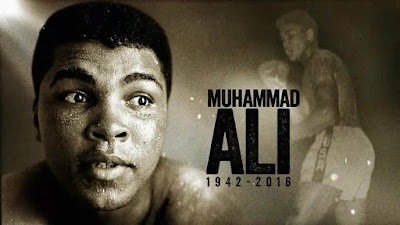
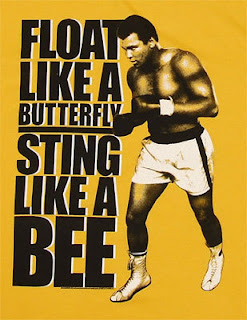
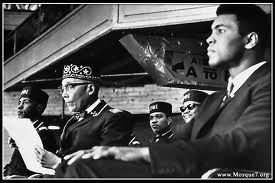

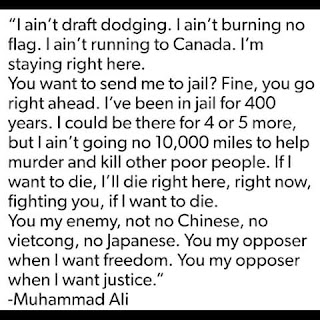
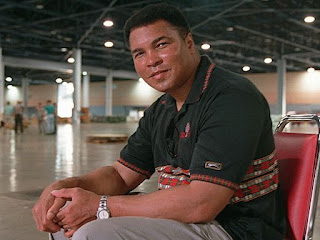
Comments